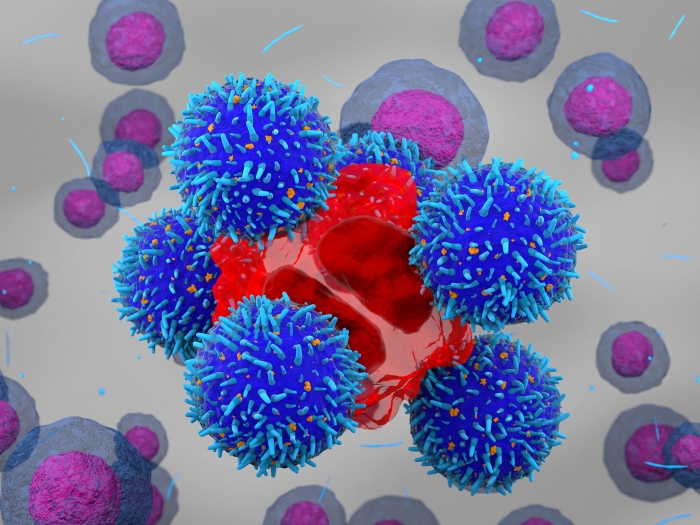A transplant hepatologist examines various facets of care when treating liver cancer patients
5:00 AM
Author |

There are several kinds of liver malignancies that can be treated through various localized therapies; however, these treatments can result in many different side effects and associated risks.
According to Michigan Medicine transplant hepatologist and medical director for both the institution’s liver tumor and living donor liver transplantation programs, Neehar Parikh, M.D., M.S., “if a patient is eligible, liver transplantation is often their best bet” when combatting hepatocellular carcinoma, which is the most common form of liver cancer with origins within the organ’s hepatocytes.
“This liver malignancy accounts for the vast majority of cases we see as providers,” said Parikh, who is also an associate professor of internal medicine at the University of Michigan Medical School. “Nearly 25 to 30% of all liver transplants in the United States happen for liver cancer and transplantation should be a primary consideration for anyone diagnosed with this disease.”
Parikh added that liver transplantation is “strongly considered among providers” for individuals with hepatocellular carcinoma because “these patients also have underlying cirrhosis of the liver.”
SEE ALSO: Study may accelerate identifying patients who need liver transplants
And this may eventually lead to the development of more liver cancer down the line, regardless of current treatment outcomes.
“From the very moment a patient walks through our doors, we know as hepatologists that they have their own unique risk of developing further liver disease and related complications, even after successful therapies.”
As a national rule, Parikh noted that several key factors regularly go into the decision-making process of adding a patient to the liver transplant list, however “Michigan Medicine also considers several things that are unique to the institution.”
“It’s fairly standard practice for transplant hepatologists to ‘transplant’ early-stage liver cancer patients because the risk of reoccurrence can only go up from where they are,” said Parikh.
“But it’s also important to determine the safety of ‘downstaging’ patients or reducing their tumor burden and bringing them down to lower stages of cancer, through various therapies before considering a transplant.”
Furthermore, Parikh added that Michigan Medicine is a part of the Multicenter Evaluation of Reduction in Tumor Size, or MERITS-LT, Consortium, which actively explores the benefits of safely downstaging liver cancer patients before transplantation occurs.
“In a recent multiregional study, this national consortium observed a more than 80% probability of initial downstaging with relatively low rates of subsequent tumor progression before liver transplantation through using various techniques,” he said.
There’s hope for patients living with cirrhosis
“Collectively, the MERITS-LT Consortium is also conducting further research in the realm of systemic therapies, so evaluating how effective things like immunotherapies are for shrinking cancerous liver tumors before liver transplantation, for example. A lot of innovation is happening within this national group to better understand the benefits of downstaging patients before liver transplantation, and I’m glad that Michigan Medicine is a part of it.”
Parikh also referenced recent research from a team of liver experts that examined the survival rates of patients with nonresectable, or inoperable, liver metastases from colorectal cancer.
Nearly 25 to 30% of all liver transplants in the United States happen for liver cancer. Transplantation should be a primary consideration for anyone diagnosed with liver cancer.” Neehar Parikh, M.D., M.S.
Their findings revealed that “liver transplantation provides the longest overall survival rates in colorectal cancer patients,” as “improved selection criteria” ultimately helped combat the lingering presence of inoperable metastasized liver tumors.
SEE ALSO: Prevention of Liver Cancer & Risks of Chronic Liver Disease (michiganmedicine.org)
“Because this research is very new, our team only recently started implementing this approach to patient selection for liver transplantation,” said Parikh.
“Previously, individuals with nonresectable colorectal cancer receiving chemotherapy had a roughly five-year overall survival rate of about 10%. But this type of approach to care within a population that was traditionally overlooked for liver transplantation has produced survival rates as high as 60%, which is rather astounding."
In addition, Parikh noted that liver cancer care at Michigan Medicine is a “uniquely collaborative effort.”
“What many people don’t know is that our oncologists have very close relationships with nearly every level of the overall care team. Everyone works together to seamlessly navigate the system and ensure that our patients receive the treatments they need to make them good transplant candidates,” he said.
“Michigan Medicine also has a robust surveillance program after transplantation occurs to ensure that our patients are being monitored with unique protocols and a personalized touch. As organ recipients, their success both before and after surgery is hugely important to us.”
Papers cited:
“Survival Following Liver Transplantation for Patients with Nonresectable Liver-only Colorectal Metastases,” Annals of Surgery. DOI: 10.1097/SLA.0000000000003404
“Downstaging Outcomes for Hepatocellular Carcinoma: Results from the Multicenter Evaluation of Reduction in Tumor Size before Liver Transplantation (MERITS-LT) Consortium,” Gastroenterology. DOI: 10.1053/j.gastro.2021.07.033

Explore a variety of health care news & stories by visiting the Health Lab home page for more articles.

Department of Communication at Michigan Medicine
Want top health & research news weekly? Sign up for Health Lab’s newsletters today!





